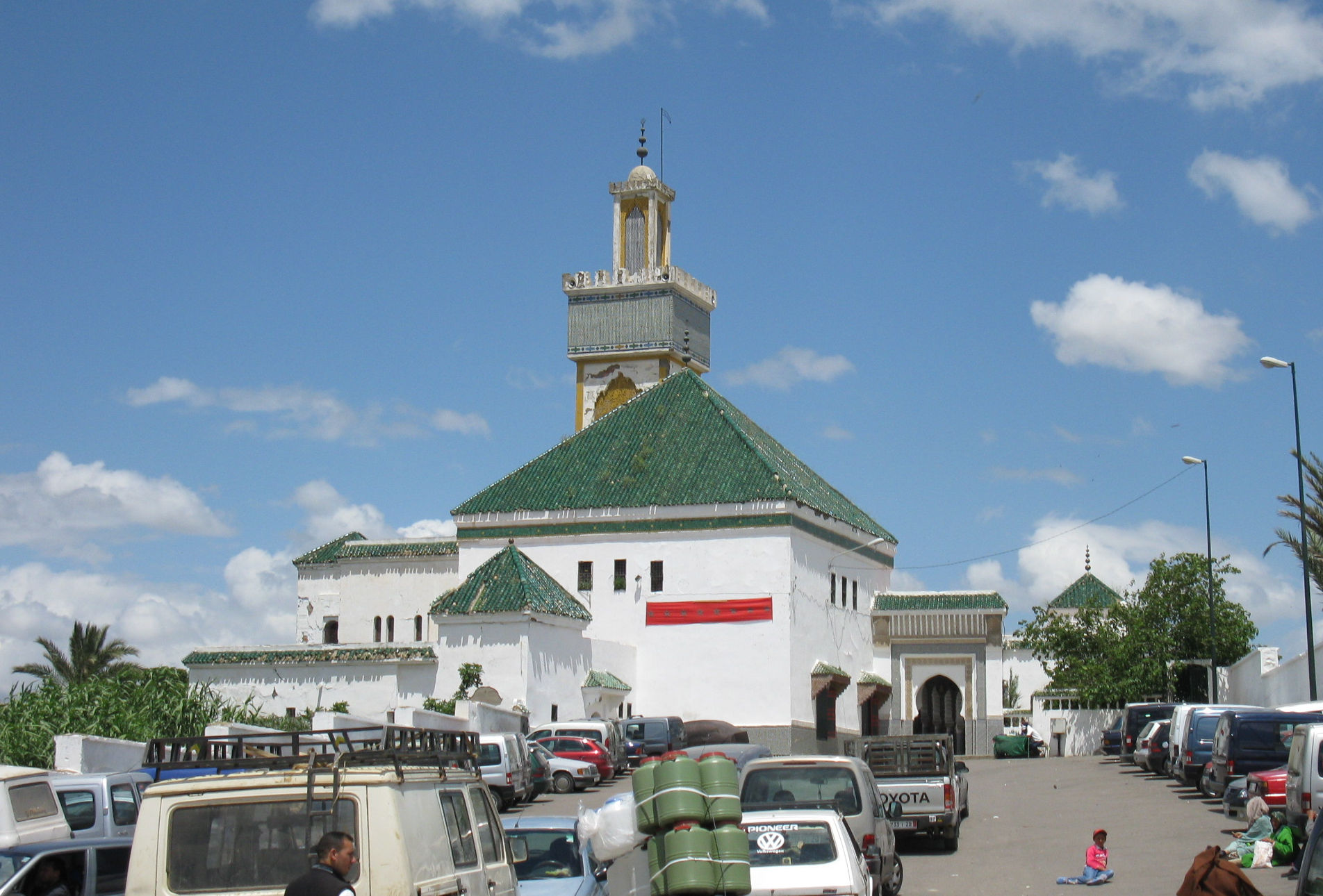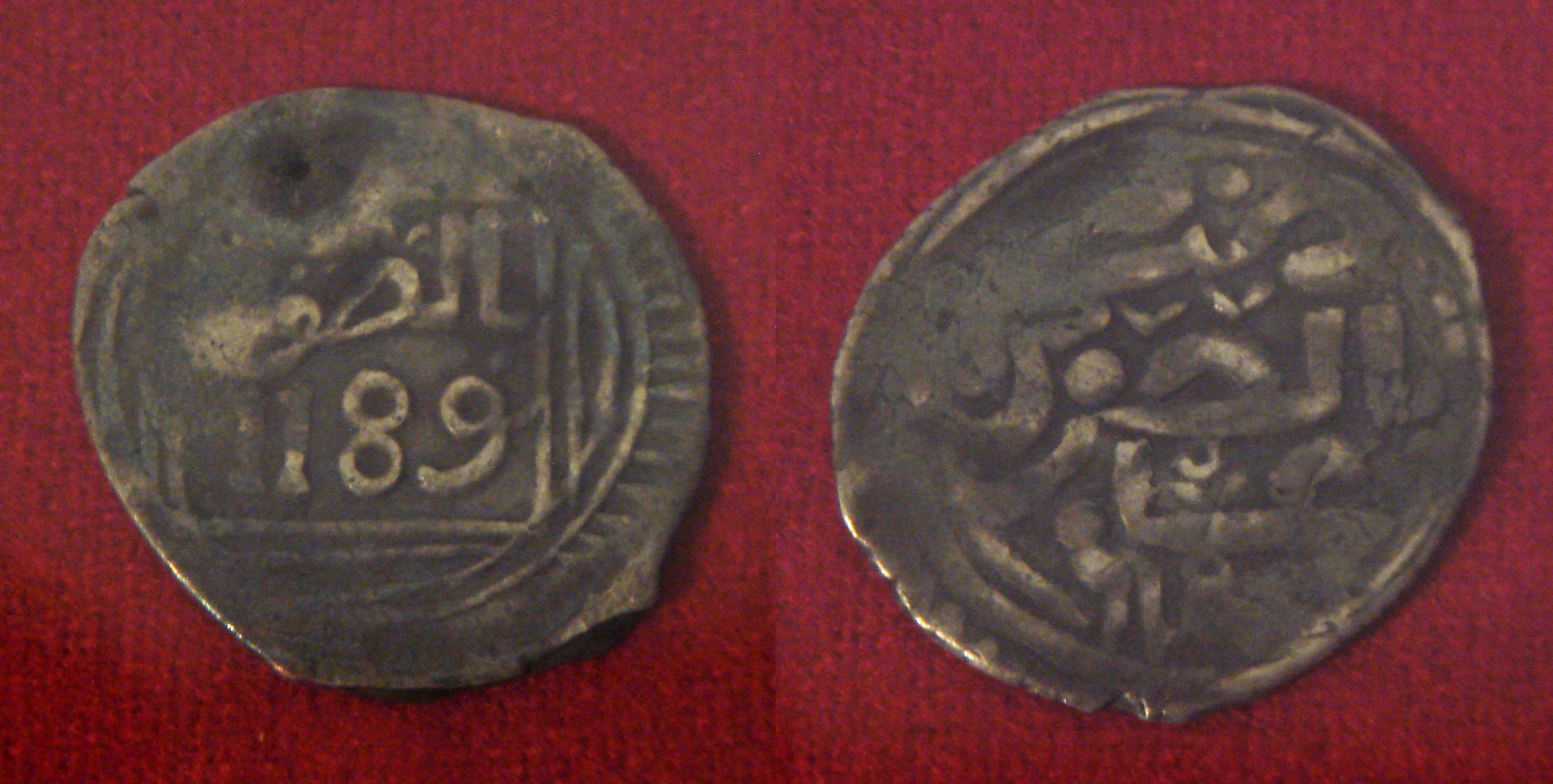|
Mohammed Al-Hadi Ben Issa
Muḥammad al-Hādī ibn ʿĪsā al-Ṣufyānī al-Mukhtārī (; 1467–1526) also known by his title al-Shaykh al-Kāmil () was a Moroccan scholar of Sufism and also an ascetic. He was the founder of the Isawiyya Sufi order. Biography Mohammed al-Hadi ben Issa was a distant descendant of Idris I of Morocco, and he came from the tribe of Awlad Abi Sebaa. He spent most of his childhood as an orphan; his father and brothers fought against the Portuguese but were killed by their commander, Afonso V of Portugal. In his teenage years, he was initiated into the Sufi order of Muhammad al-Jazuli, and lived on to succeed him in such matters. He was a very patient and calm person as he grew older, with more reliance on his god. He became a popularity amongst the people around him, and he took advantage of this to start his own Sufi order, the Isawiyya. Mohammed al-Hadi ben Issa died in 1526, and he was buried in Meknes, where a shrine was established over his grave.an-Noor al-Shameel b ... [...More Info...] [...Related Items...] OR: [Wikipedia] [Google] [Baidu] |
Safi, Morocco
Safi () is a city in western Morocco on the Atlantic Ocean. It is the capital of Asfi Province. It recorded a population of 308,508 in the 2014 Moroccan census. The city was occupied by the Portuguese Empire from 1488 to 1541, was the center of Morocco's weaving industry, and became a ''fortaleza'' of the Portuguese Crown in 1508. Safi is the main fishing port for the country's sardine industry, and also exports phosphates, textiles and ceramics. During the Second World War, Safi was the site of Operation Blackstone, one of the landing sites for Operation Torch. Etymology 11th-century geographer Muhammad al-Idrisi gave an explanation to the origin the name "Asafi" as he linked it to the Arabic word "Asaf" (regret); Asafi (my regret). He based this claim on a strange story about some sailors from al-Andalus who sailed to discover the other end of the Atlantic Ocean but got lost and landed on some island where the natives captured them and sent them back on their ships blindfolded. ... [...More Info...] [...Related Items...] OR: [Wikipedia] [Google] [Baidu] |
Libya
Libya, officially the State of Libya, is a country in the Maghreb region of North Africa. It borders the Mediterranean Sea to the north, Egypt to Egypt–Libya border, the east, Sudan to Libya–Sudan border, the southeast, Chad to Chad–Libya border, the south, Niger to Libya–Niger border, the southwest, Algeria to Algeria–Libya border, the west, and Tunisia to Libya–Tunisia border, the northwest. With an area of almost , it is the 4th-largest country in Africa and the Arab world, and the List of countries and outlying territories by total area, 16th-largest in the world. Libya claims 32,000 square kilometres of southeastern Algeria, south of the Libyan town of Ghat, Libya, Ghat. The largest city and capital is Tripoli, Libya, Tripoli, which is located in northwestern Libya and contains over a million of Libya's seven million people. Libya has been inhabited by Berber people, Berbers since the late Bronze Age as descendants from Iberomaurusian and Capsian cultures. I ... [...More Info...] [...Related Items...] OR: [Wikipedia] [Google] [Baidu] |
15th-century Moroccan Writers
The 15th century was the century which spans the Julian calendar dates from 1 January 1401 (represented by the Roman numerals MCDI) to 31 December 1500 (MD). In History of Europe, Europe, the 15th century includes parts of the Late Middle Ages, the Early Renaissance, and the early modern period. Many technological, social and cultural developments of the 15th century can in retrospect be seen as heralding the "European miracle" of the following centuries. The Perspective (graphical), architectural perspective, and the modern fields which are known today as banking and accounting were founded in Italy. The Hundred Years' War ended with a decisive Kingdom of France, French victory over the Kingdom of England, English in the Battle of Castillon. Financial troubles in England following the conflict resulted in the Wars of the Roses, a series of dynastic wars for the throne of England. The conflicts ended with the defeat of Richard III by Henry VII of England, Henry VII at the Ba ... [...More Info...] [...Related Items...] OR: [Wikipedia] [Google] [Baidu] |
1526 Deaths
Year 1526 (Roman numerals, MDXXVI) was a common year starting on Monday of the Julian calendar. Events January–March * January 14 – Treaty of Madrid (1526), Treaty of Madrid: Peace is declared between Francis I of France and Charles V, Holy Roman Emperor. Francis agrees to cede Burgundy and abandons all claims to Flanders, Artois, Kingdom of Naples, Naples, and Duchy of Milan, Milan. * January 26 – The deadline for Forced conversions of Muslims in Spain, Spanish Muslims to convert to Christianity or leave is reached in the Crown of Aragon and the Principality of Catalonia as decreed by the edict of November 25 by Charles V, Holy Roman Emperor acting in his capacity as King of Spain. The deadline for the Kingdom of Valencia had passed on December 31, 1525. * February 6 – Suleiman the Magnificent, Sultan of the Ottoman Empire, agrees to form a military alliance with Kingdom of France, France, after King Francis I of France, François I sends a proposa ... [...More Info...] [...Related Items...] OR: [Wikipedia] [Google] [Baidu] |
1467 Births
Year 1467 ( MCDLXVII) was a common year starting on Thursday of the Julian calendar. Events January–December * June 15 – Philip the Good is succeeded as Duke of Burgundy, by Charles the Bold. * October 29 – Battle of Brustem: Charles the Bold defeats the Prince-Bishopric of Liège. * October 30 or November 11 – Battle of Chapakchur: Uzun Hasan defeats Jahan Shah. * November 12 – Regent of Sweden Erik Axelsson Tott supports the re-election of deposed Charles VIII of Sweden to the throne. * December 15 – Battle of Baia: Troops under Stephen III of Moldavia decisively defeat the forces of Matthias Corvinus, King of Hungary, at Baia (present-day Romania). This is the last Hungarian attempt to subdue the Principality of Moldavia. Date unknown * Third Siege of Krujë: A few months after the failure of the second siege, Mehmed II leads another unsuccessful Ottoman invasion of Albania. * The Ōnin War (1467– 1477), which initiates the ... [...More Info...] [...Related Items...] OR: [Wikipedia] [Google] [Baidu] |
Moroccan Sufis
Moroccan may refer to: * Something or someone from, or related to the country of Morocco ** Moroccans, or Moroccan people ** Moroccan Arabic, spoken in Morocco ** Moroccan Jews See also * Morocco leather * * {{disambig Language and nationality disambiguation pages ... [...More Info...] [...Related Items...] OR: [Wikipedia] [Google] [Baidu] |
People From Meknes
The term "the people" refers to the public or common mass of people of a polity. As such it is a concept of human rights law, international law as well as constitutional law, particularly used for claims of popular sovereignty. In contrast, a people is any plurality of persons considered as a whole. Used in politics and law, the term "a people" refers to the collective or community of an ethnic group or nation. Concepts Legal Chapter One, Article One of the Charter of the United Nations states that "peoples" have the right to self-determination. Though the mere status as peoples and the right to self-determination, as for example in the case of Indigenous peoples (''peoples'', as in all groups of indigenous people, not merely all indigenous persons as in ''indigenous people''), does not automatically provide for independent sovereignty and therefore secession. Indeed, judge Ivor Jennings identified the inherent problems in the right of "peoples" to self-determination, as i ... [...More Info...] [...Related Items...] OR: [Wikipedia] [Google] [Baidu] |
List Of Sufi Saints
Sufi saints or wali (, plural ʾawliyāʾ أولياء) played an instrumental and foregrounding role in spreading Islam throughout the world. In the traditional Islamic view, a saint is portrayed as someone "marked by pecialdivine favor ... ndholiness", and who is specifically "chosen by God and endowed with exceptional gifts, such as the ability to work miracles."Radtke, B., "Saint", in: ''Encyclopaedia of the Qurʾān'', General Editor: Jane Dammen McAuliffe, Georgetown University, Washington, D.C. List A * Abul Hasan ash-Shadhili * Ali Hisam-ad-Din Naqshbandi * Ameer Muhammad Akram Awan (1934–2017, 12th Sheikh of Silsila Naqshbandia Owaisiah and writer of several books and 03 Tafaseer of the Holy Qur'an) * Abdallah ibn Alawi al-Haddad (1634–1720, buried in Hadhramaut, author on several books on Dhikr) * Abdullah Ansari * Abdullah Shah Ghazi (d. 720, buried in Karachi) * Abdul Khaliq Ghajadwani (d. 1179, buried in Bukhara, one of the Khwajagan of the Na ... [...More Info...] [...Related Items...] OR: [Wikipedia] [Google] [Baidu] |
Islam In Morocco
Islam is the largest religion in Morocco, with more than 99% of the population adhering to it. The largest subset of Muslims in Morocco are Maliki Sunni; other numerous groups include practitioners of Zahirism and non-denominational Muslims. Islam is the nation's state religion. Blasphemy against Islam is a punishable offense. History Islam was first brought to Morocco in 681 A.D. by an Arab invasion under the Uqba ibn Nafi, who was a general serving under the Umayyads of Damascus. In 788, The Shia Idrisids who espoused pro Zaydi views ruled large parts of Morocco. Their contemporaries included the heretical Barghawata state and the Khariji state of Sijilmasa. After, several Berbers formed more powerful Islamic dynasties that reigned over the country. Among them were the Almoravids (1040–1147), who was the first to unite Morocco, as well as significant regions in West Africa, Spain and Algeria. The Almoravids were responsible for making the Maliki school of Islamic juris ... [...More Info...] [...Related Items...] OR: [Wikipedia] [Google] [Baidu] |
Mohammed Ben Abdallah
''Sidi'' Mohammed ben Abdallah ''al-Khatib'' (), known as Mohammed III (), born in 1710 in Fez, Morocco, Fes and died on 9 April 1790 in Meknes, was the List of rulers of Morocco, Sultan of Morocco from 1757 to 1790 as a member of the 'Alawi dynasty. He was the governor of Marrakesh around 1750. He was also briefly sultan in 1748. He rebuilt many cities after the 1755 Lisbon earthquake, earthquake of 1755, including Essaouira, Mogador, Casablanca, and Rabat, and Abdallah Laroui described him as "the architect of modern Morocco." He also defeated the French in the Larache expedition in 1765 and expelled the Portuguese from Mazagan (El Jadida, ''al-Jadīda'') in 1769. He is notable for having been the first leader to recognize American Revolution, American independence in his alliance with Luis de Unzaga 'le Conciliateur' through correspondence and Unzaga's secret intelligence service and led by his brothers-in-law Antonio and Matías de Gálvez from the Canary Islands. He was the so ... [...More Info...] [...Related Items...] OR: [Wikipedia] [Google] [Baidu] |
Alaouite
The Alawi dynasty () – also rendered in English as Alaouite, Alawid, or Alawite – is the current Moroccan royal family and reigning dynasty. They are an Arab Sharifian dynasty and claim descent from the Islamic prophet Muhammad through his grandson, Hasan ibn Ali. Their ancestors originally migrated to the Tafilalt region, in present-day Morocco, from Yanbu on the coast of the Hejaz in the 12th or 13th century. The dynasty rose to power in the 17th century, beginning with Mawlay al-Sharif who was declared sultan of the Tafilalt in 1631. His son Al-Rashid, ruling from 1664 to 1672, was able to unite and pacify the country after a long period of regional divisions caused by the weakening of the Saadi Sultanate, establishing the Alawi Sultanate that succeeded it. His brother Isma'il presided over a period of strong central rule between 1672 and 1727, one of the longest reigns of any Moroccan sultan. After Isma'il's death, the country was plunged into disarray as his sons ... [...More Info...] [...Related Items...] OR: [Wikipedia] [Google] [Baidu] |






